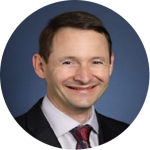
University of California, Davis
Presentation Abstract
Methods to Increase the Economic Evidence Supporting the Value of Cancer Care
The US health care system is plagued with imperfections that result in sizable inefficiencies, with failures in care delivery, failures of care coordination, and overtreatment of low value care costing upwards of $340 billion each year. Reducing waste requires a better evidence base along two dimensions. The first is efficacy–we need to know what treatments work. However, identifying effective treatments is not sufficient to ensure patients get these treatments. We also need an evidence base on ways to encourage the implementation of efficacious treatments.
With this financial backdrop in mind, and because a lack of economic data has been cited as a barrier to implementation, especially when health care system executives are asked to allocate finite resources amidst competing demands, I see three opportunities for improving nutrition in cancer care. First, I would encourage the National Institutes of Health (NIH) to encourage more “hybrid” trials. These hybrid trials are designed to jointly test questions of efficacy and implementation.
Second, we need more evidence on the economic outcomes associated with improving nutrition in cancer care. The strongest evidence is likely to come out of these trials, thus it makes sense to include economic endpoints into the trials themselves. Studies that evaluate the cost of implementation strategies remain rare, but including an economic evaluation alongside the hybrid trial provides evidence on how to create financially sustainable programs. For these trials to be successful, they should be included in the planning and allowed to provide input on major design decision.
Economic evaluations in implementation studies often take the payer’s perspective. But because access to nutritional food varies by where patients live, we also need to understand the economics from the patient’s perspective. Optimizing the health care system’s cost may not be sufficient to improve cancer outcomes for everyone. We may need to understand the context in which patients live. Developing sustainable solutions is likely easier when patients are lucky to have a lot of local resources, while other patients will need more assistance when they live in a food desert.
Third and finally, sustainability may be helped or hindered by how health care providers are paid. The US is currently experimenting with alternative payment models. Some of these models may offer unique insights, and thus the trial designs should consider testing alternative financial mechanisms that could enhance adoptions and sustainability.
About Dr. Hoch
Dr. Hoch received a Ph.D. in health economics from the Johns Hopkins School of Public Health after earning a masters in economics from the Johns Hopkins University, and a Bachelor of Arts degree in quantitative economics and decision sciences from the University of California at San Diego. Currently, he is Professor and Chief of the Division of Health Policy and Management in the Department of Public Health Sciences, and the Associate Director of the Center for Healthcare Policy and Research at the University of California at Davis. He teaches courses in health economics and studies value in health care. He has contributed to more than 200 peer-reviewed articles to the scientific literature. Dr. Hoch worked in Canada for over 15 years before being recruited to the University of California at Davis from his position as a Research Scientist at St. Michael’s Hospital and a Professor at the University of Toronto. His time as the inaugural Director of the Pharmacoeconomics Research Unit at Cancer Care Ontario, the largest provincial cancer agency in Canada, impressed on him the importance of bi-directional education. He believes that to help others with our research, we must understand their needs and they must understand our attempts at addressing them. Dr. Hoch serves on the Society for Medical Decision Making’s Education Committee and offers a short course introducing cost-effectiveness analysis at the annual meeting. Dr. Hoch has taught throughout the world, giving over 250 invited presentations in 15 countries. He is passionate about making research and research methods more understandable and useful.
Dr. Hoch did not disclose any conflicts of interest for this workshop.